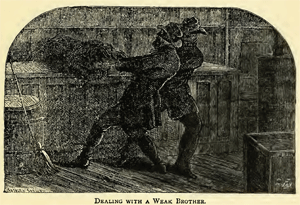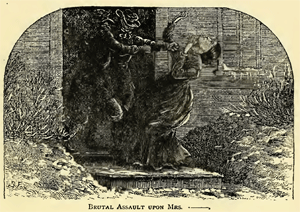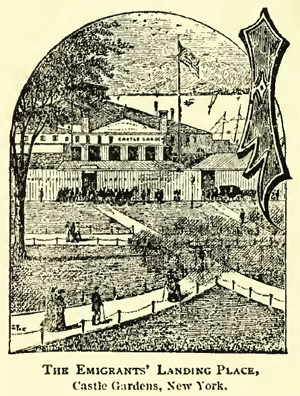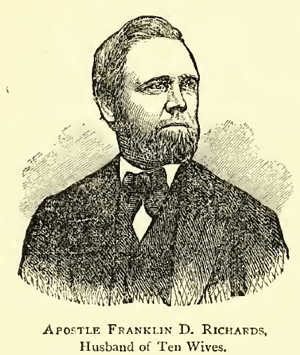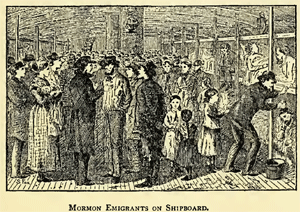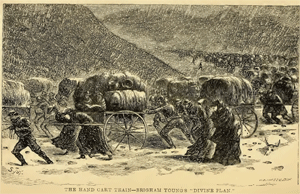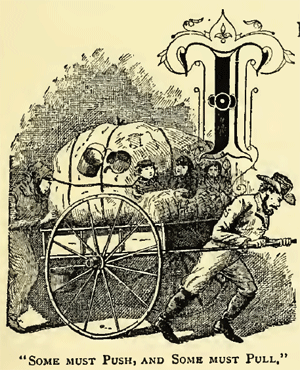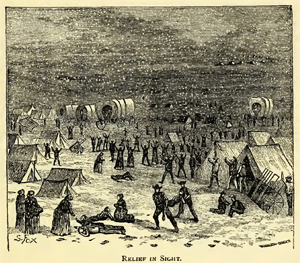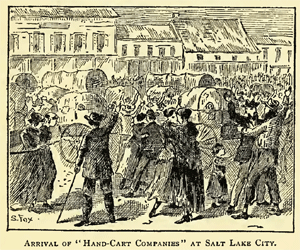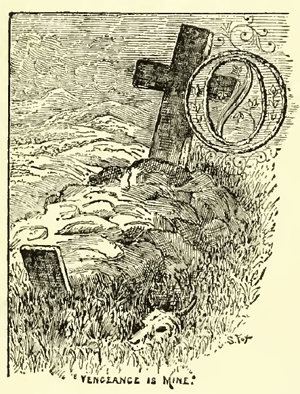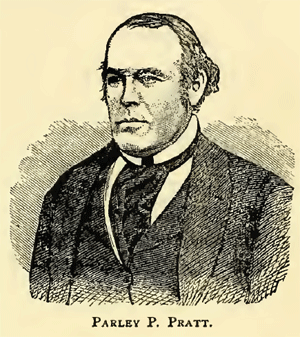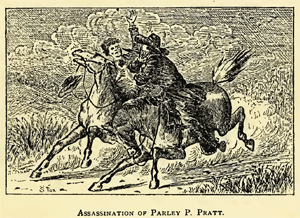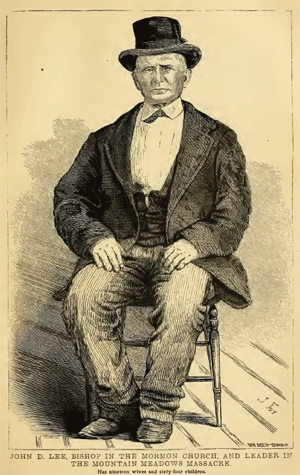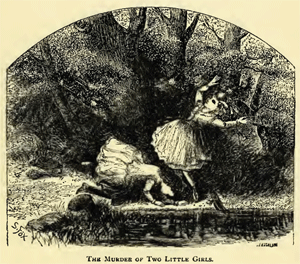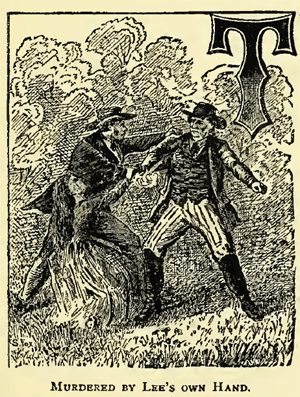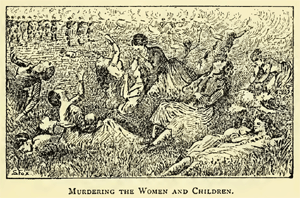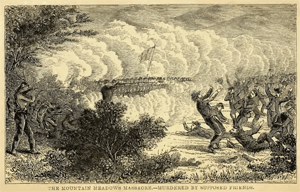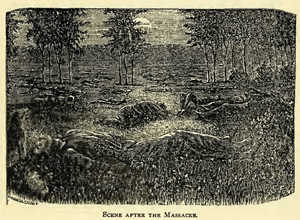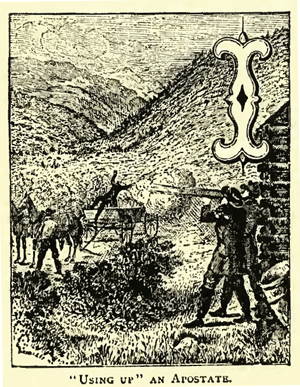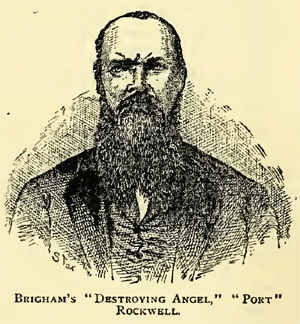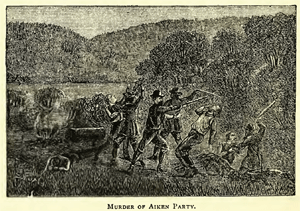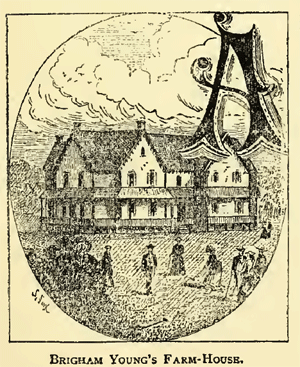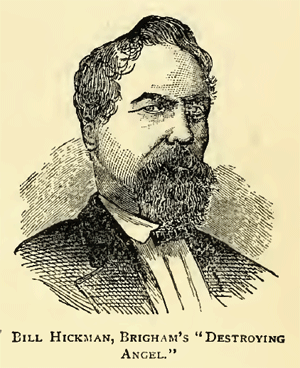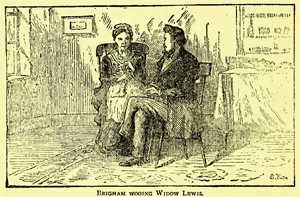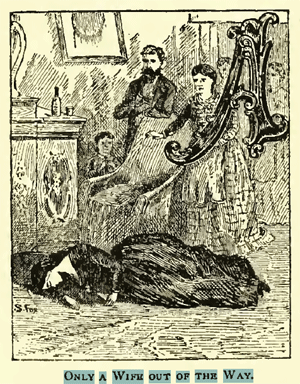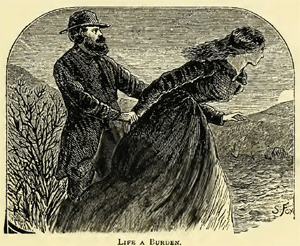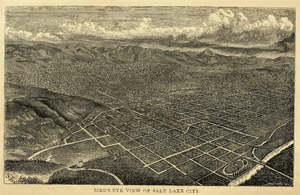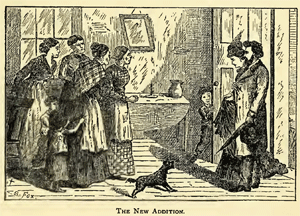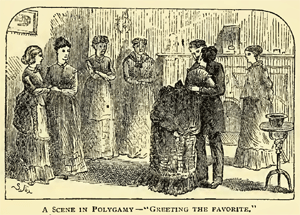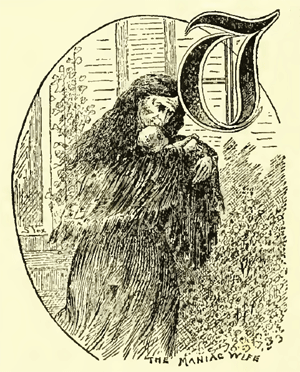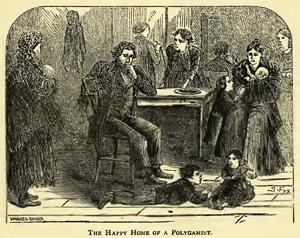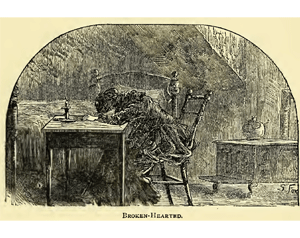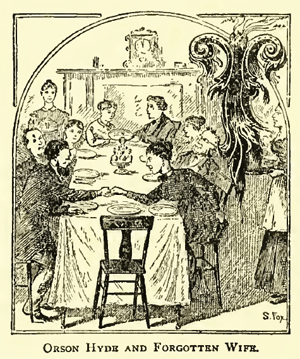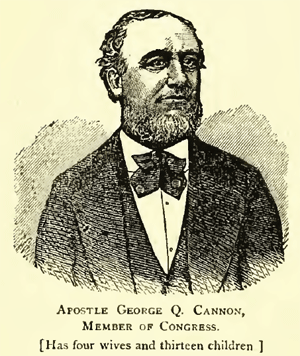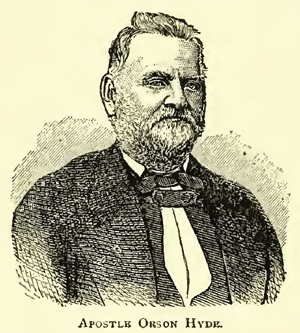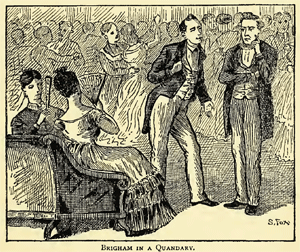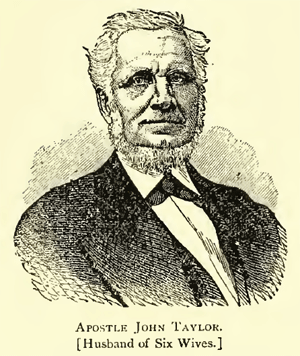The Beginning of the Reformation. The Payson Saints Stirred Up. What the Wicked "Saints" had been Doing Secretly. The Old Lady who stole a Radish. Confessing the sins of Others. A System of Espionage. Brigham bids them "Go Ahead!" The Story of Brother Jeddy's Mule. The Saints receive a terrible Drubbing. Great Excitement in Mormondom. How the Saints were Catechized. Indelicate Questions are put to Everybody. My Mother and Myself Confess. The Labors of the Home Missionaries. Making Restitution. Everybody is Re-baptized. "Cut off Below their Ears" The "Blood-Atonement " Preached. Murder recommended in the Tabernacle. Cutting their Neighbors' throats for Love. A "Reign of Terror" in Utah. Fearful Outrages Committed. Murdered "by the Indians''? Brigham advises the Assassination of Hatten. Murder of Almon Babbitt, Dr. Robinson, the Parrishes, and Others. Bloodshed the Order of the Day
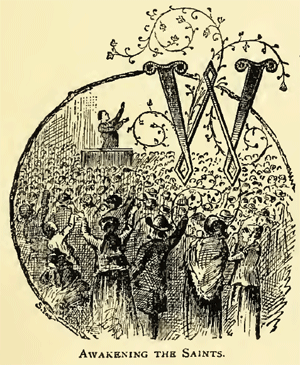
AWAKENING THE SAINTS
WHILE my father was in England on mission, my mother was urged very strongly to go to Payson, a town about seventy miles south of Salt Lake City, and start a school there.
She had taught in Kirtland, and in Salt Lake City, and was considered a person of superior attainments by the Saints. Her reputation as a teacher was quite extended among them, and since her arrival in Utah she had often been solicited to resume her profession. She had always hitherto refused persistently; but now, finding her time somewhat unemployed during my father's absence, and wishing to add to the family funds, which were running somewhat low, she decided to accept the situation, which was fairly thrust upon her. Of course I accompanied her to the scene of her labors. I had never been separated from her, and neither she nor I could endure the thought of being parted.
It was, I think, in January, 1855, that a Mormon, named Joseph Hovey, came to Payson to preach. He was a man of an excitable temperament, a fanatic in religion, and he succeeded in stirring the people up to a state of the most intense religious enthusiasm. He held a series of meetings, which were very largely attended, and such was his peculiar magnetism, that he swayed and held the multitudes who thronged to hear him, notwithstanding he was a man of unprepossessing manner, little education, and no culture. He commenced by accusing the people of all sorts of misdeeds and crimes, and he denounced them in the most scathing and the rudest fashion, and they trembled under his fierce denunciations, and cowered before him as before the face of an accusing angel. He accused them of theft, of licentiousness, of blackguardism, of lying, of swindling and cheating, of hypocrisy and lukewarmness in their religion, and of every other sin, of omission or commission, of which he could think. He represented himself as the Lord's messenger, called by Him, and sent to warn the people of Southern Utah of the horrors of their situation; their souls were in imminent peril, so weighted were they with a load of guilt. "Repent, confess, and be re-baptized," was his urgent call, "and all your sins shall be forgiven you; yea, verily, for so hath the Lord promised."
The excitement grew daily, and his work of "Reformation," as he styled it, went bravely on. Meetings were held, lasting all day and late into the night. It was religious madness run riot. There seemed to be a sort of competition as to who should confess the most and the oftenest. The people of Payson had been considered as good as average communities, but this "Reformation" revealed the most astonishing amount of dishonesty and depravity among them.
I was at one of the meetings, and I remember how shocked I was as one after another arose and confessed the crimes of which they were guilty. It made a very vivid impression on my childish mind, and to this day I can recall the very expression of the faces and tones of the voices as the owners professed their criminality. Many of them confessed to stealing flour from a mill; this, indeed, seemed a common peccadillo; others had stolen lumber for various purposes; and one man said he had stolen a sheep. I remember this man very distinctly; there happened to be a bit of wool sticking to his clothes, on the shoulder, and I know I wondered if that was from the sheep he had stolen.
Some had taken potatoes, some turnips, some others parsnips, others had taken all three; one conscience-stricken old lady, who felt impelled to confess, and could think of nothing that she had done wrong, was immensely relieved when she remembered that she had taken a radish without permission; she seemed, too, to derive much consolation from the fact that "it had burned in her stomach ever since."
Taking it all in all, it was a time of the wildest confusion and the intensest ill-feeling. If there were any persons who did not come forward readily, and acknowledge their faults, some one would do it for them, telling their brothers' and sisters' sins in the public congregation.
My mother did not approve of the state of affairs, and would not countenance them any farther than she was positively compelled to do. It was dangerous to express any disapproval of the proceedings; so she was obliged to keep quiet, although she would not take active part in the excitement. The most fanatical of these blinded enthusiasts did not hesitate to threaten the lives of all who dared dissent from them, and the person who failed to confess was looked upon with suspicion. A close watch was kept upon the actions of these persons, and every word that dropped from their lips was noted. In fact, the entire church, with few exceptions, was converted into a detective force, to keep vigilant watch over those few exceptions who were found to be "cool in the faith."
While the excitement was at its height, Brigham Young was informed of Hovey's movements, and their results in Payson. The few who were not in sympathy with the excitement waited anxiously for the Prophet to speak, expecting, of course, that when he heard the state of affairs, there would he a summary stop put to all these fanatical proceedings. Many of the surrounding settlements were very much exercised over the conduct of the Payson people, thinking they were all going mad together; and they also waited curiously to see what action Brigham would take. He was at Fillmore, attending the legislature, when he was told of the excitement at Payson, and his reply was, "Let them go ahead; they won't confess to more than they are guilty of."
As may be supposed, this cavalier manner of treating the matter surprised the more thoughtful of the Saints, who had counted confidently on his interference; but their surprise increased tenfold, when, the very next winter, 1856, Brigham and his counsellors instituted a similar reform throughout the entire territory. It is said that this latter Reformation was caused by President Jedediah M. Grant losing his temper over a mule.
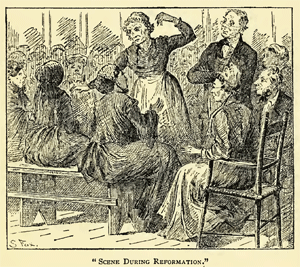
"SCENE DURING REFORMATION."
It seems that Brother Grant was to hold a meeting at Kaysville, and had invited several elders to accompany him. To one of these elders he lent a mule, which should bear him to the appointed place. When he arrived, the sharp eyes of Brother Grant discovered that his mule was heated and somewhat jaded; and although he made no remarks at the time, but, on the contrary, was suavity itself, yet he did not let the brother go unrebuked. After every one had spoken at the meeting, testifying to the utmost good feeling themselves, and exhorting faithfulness on the part of their hearers, Brother Grant arose for the last word. He accused the speakers who had preceded him of inconsistency and hypocrisy; charged the bishop with inefficiency, and his people with all manner of crimes, and then personally attacked the unfortunate brother for ill-treating his mule. He called upon everybody to repent, and "do their first works over again," or the judgment of God would speedily overtake them. This was the beginning of the famous Utah "Reformation," of which the local movement at Payson was the immediate forerunner. It was the same thing on a much larger scale; confessions were the order of the day, and accusation was as prevalent as confession. It was a horrible time, and one that never will be forgotten by those who were living in the midst of the excitement. An impressionable twelve-years-old girl, I remember every detail with wonderful distinctness.
This "Reformation" was more systematically conducted than Hovey's revival; a catechism was compiled by the leading spirits of the church, and printed by their order, and elders were appointed to go from house to house with a copy of it, questioning the people. This catechism contained a list of singular questions, many of which I distinctly remember. I dare only mention a few. They were after this style:
"Have you ever committed a murder?"
"Have you ever stolen anything?"
"Have you ever been drunk?"
"Do you believe in polygamy?"
Many were grossly indelicate, others laughably absurd; yet every question was obliged to be answered on pain of expulsion from the church. Men, women, and children alike were catechized; many of the little ones did not know the meaning of some of the questions which were put to them; but they were obliged to answer them; whether understandingly, or not, it made no difference.
It was customary to catechize each member of a family separately; but an exception was made in our case, and my mother and myself were examined together. There was a great part of the catechism that I did not understand, but I always answered as my mother did, feeling sure that what she said must of a necessity be right. When the questioning was over, I was exhorted by the visiting elder to obey my parents, and to marry into polygamy when a little older.
The elders that acted as "Home Missionaries," whose duty it was to catechize the people, were astonished at the grossness of some of the immoralities which were brought to light. The private history and secret acts of all were unfolded. People were accused of sins which they never had committed, and yet they were afraid to deny them. Some of the elders were shocked beyond measure at the sickening details revealed, and begged that a stop be put to this mania for confession; but the poor fanatics were urged forward by their leaders, and they firmly believed that in the fullest and freest confession lay their only hope of salvation. They were goaded to the very verge of frenzy. Every person throughout the Territory was commanded to be rebaptized, even if their sins had not been very grave. It was commanded, too, that every person who had committed a theft should make good what he had taken; and I recollect a man returning some property to my father which he had taken from the family while my father was in England: some others confessed to having stolen the fence from the farm; so, it seems, we had suffered from the dishonesty of our before presumedly honest neighbors. Throughout the whole church there was a general time of accusation, confession, restitution, and re-baptism.
There were many of the Mormon people who did not approve of all this unhealthy excitement, and who foresaw exactly what results would follow, yet not one of them dared venture a protest. It would have been at the risk of their lives, as it was publicly advised, not only by Hovey in Payson, but by men in much more prominent places, to punish such persons as ventured a disapproval by "cutting them off from the church, below their ears."
It was during this excitement that the terrible doctrine of the Blood-Atonement was first preached. So high did the feeling run that people who were guilty of certain crimes were counselled to shed their blood to save their souls. Said the arch-fanatic Jedediah M. Grant, in the Tabernacle, speaking of those who had apostatized or were in danger of apostasy,
"What ought this meek people, who keep the commandments of the Lord, to do unto them? 'Why,' says some one, 'they ought to pray to the Lord to kill them.' I want to know if you would wish the Lord to come down and do all your dirty work? Many of the Latter-Day Saints will pray, and petition, and supplicate the Lord to do a thousand things they themselves would be ashamed to do. When a man prays for a thing, he ought to be willing to perform it himself."
In the same sermon he said,
"What! do you believe that people would do right and keep the law of God by actually putting to death the transgressors? Putting to death the transgressors would exhibit the law of God, no matter by whom it was done. That is my opinion."
Following the expression of his belief, he uttered the following fervent wish:
"I wish we were in a situation favorable to our doing that which is justifiable before God, without any contaminating influence of Gentile amalgamation, laws, and traditions, that the people of God might lay the axe to the root of the tree, and that every tree that bringeth not forth good fruit might be hewn down."
He was so in earnest that he would have the atonement by blood commence at once. Listen to his disinterested counsel: --
"I say there are men and women here that I would advise to go to the President immediately, and ask him to appoint a committee to attend to their case; and then let a place be selected, and let that committee shed their blood."
On another occasion he said, speaking in his wild, fanatical manner,
"We have been trying long enough with this people; and I go in for letting the sword of the Almighty to be unsheathed, not only in word, but in deed."
Brigham Young, not to be behind his counsellor, assured the Saints that this doctrine of throat-cutting and blood-shedding was pleasing to the Lord, and that it was a glorious and soul-saving belief. He says,
"There are sins that can be atoned for by an offering on the altar, as in ancient days; and there are sins that the blood of a lamb or calf, or of turtle-doves, cannot remit, but they must be atoned for by the blood of the man."
Another choice bit from one of his Tabernacle discourses is as follows:
"The time is coming when justice will be laid to the line and righteousness to the plummet: when we shall take the old broadsword, and ask, 'Are you for God?' and if you are not heartily on the Lord's side, you will be hewn down."
In a sermon preached from the text, the sweetest and tenderest of all the commandments given by Christ, "Love thy neighbor as thyself," Brigham Young put this peculiarly Christ-like construction on the words:
"When will we love our neighbor as ourselves? Any of you who understand the principles of eternity, if you have sinned a sin requiring the shedding of blood, except the sin unto death, should not be satisfied or rest until your blood should be spilled, that you might gain that salvation you desire. That is the way to love mankind. Now, brethren and sisters, will you live your religion? How many hundreds of times have I asked that question? Will the Latter- Day Saints live their religion?"
He also asked in the same sermon,
"Will you love your brothers and sisters when they have a sin that cannot be atoned for without the shedding of their blood? Will you love that man or that woman well enough to shed their blood? That is what Jesus meant.
"The time will come when the law of God will be in full force. This is loving our neighbor as ourself: if he needs help, help him; if he wants salvation, and it is necessary to spill his blood upon the earth in order that he may be saved, spill it."
It is no wonder that such language as this, poured into the ears of the already half-crazed Saints, should incite them to deeds of violence. For a while bloodshed and murder were the order of the day. If any person or family were supposed to be lacking in the faith, and failing to exhibit the usual blind submission to the teachings of the priesthood, that person or family was sure to be visited by some disaster — whipped, mobbed, or murdered, and their property destroyed or confiscated to the use of the church. Some instances came under my own observation, and I tell the incidents from actual knowledge, and not from mere hearsay.
A merchant of Salt Lake City, an Englishman, named Jarvis, was suspected of being cool in the faith, and to have little or no sympathy with the fanatical proceedings which attended the Reformation and formed its chief feature. His store was entered one evening by Saints in disguise, he was pulled over the counter by the hair of his head, dragged into the street and thrown into the snow, his store plundered, all the money taken away, his house set on fire, and his two wives barely given time to escape with their children. As an excuse for all this he was accused of having "spoken against the authorities, and had entertained Gentiles at supper."
One of the wives of Mr. Jarvis wrote quite a thrilling account to some of her English friends respecting their treatment; and as her story is so simply and yet plainly told, I shall insert it here, as being the best description I can give of it and similar scenes. It is dated from "Weston, Missouri," the August following the year of the Reformation.
"After Mr. Grimshaw left Salt Lake, Mr. Jarvis made known to Brigham Young his intention to leave the Territory and return to the States, with his reasons for so doing; but his letter was never answered. Brigham made some allusion to it in public, which seemed to convey the idea that he approved of the course Mr. Jarvis had taken, rather than try to leave clandestinely. From that time we began to dispose of our property, and draw everything into as small a compass as possible. As the winter drew on, various reports were circulated; such as, that we intended to dispose of our large house to the soldiers, and were buying grain to store it for them. This is a 'capital' offence in the Salt Lake Valley, for the Mormons protest that no soldier shall sleep in Salt Lake City one night. It was also said that Mr. Jarvis had sworn to take the life of President Young; that he was boarding States officers at his house; and many more such stories, as strange and unlikely as they were untrue; for when Mr. Jarvis wrote to President Young, he made the offer of all or any part of his property to him first, if he chose to purchase it, and told him that he would rather sell it to the church than to anyone else. Time passed on, and we heard some whispers that something dreadful was going to happen to us; but we thought little about it, and felt perfectly safe, until the 13th of January, 1857, when, at half past six in the evening, a man knocked at the front door, which was locked, and asked for some trifling article out of the shop. While Mr. Jarvis was attending to him, two men walked in and hastily stepped up to him. One of them caught him by the hair and by the collar, and pulled him across the counter, saying, 'You are my prisoner.' Mr. Jarvis said, 'For what? If you have any charge against me, I will go where you wish.' To this no answer was returned but oaths and curses. They dragged him on the ground some distance, and then brought him back into the doorway, all the time trying to strangle him, and threatening to shoot him if he made any noise. One of them made a desperate kick at him but missed his aim.
Dealing with a Weak Brother.
"In the mean time Betsey and I were undressing the children; and hearing sounds of heavy footsteps and muttering undertones of strange voices and persons struggling in the passage, we looked at each other, and rushed to the door, each with a child in our arms. I succeeded in pulling open the room door in the passage, but I had no sooner done so than a man who was holding the door knocked me back into the room, flat upon the floor, with the baby in my arms, and, shutting the door again, held it fast. Instantly I laid the baby on the carpet, and, with all my strength, forced open the door, and found myself surrounded by a number of ruffians, -- I believe five or six, -- who were all in the dark, for they had extinguished the candle, and I calling aloud for Mr. Jarvis several minutes. In the end he, gasping for breath, answered me.
"When I found where he was, I made a desperate rush at the man who was holding him, and the fellow, lifting up his hand, let go his hold of him, and he darted out of the open door like lightning, across the street, and round the corner to a neighbor's house to obtain assistance. He got to the door almost exhausted, and begged for help; but no one dared come until the master of the house, who was absent, returned. They fetched him, and when he heard the particulars of the attack made upon us, he said, 'Sir, you must leave my house instantly. I have no sympathy for you. I would not protect my own father under the same circumstances.' Mr. Jarvis said, 'What have I done?' The man replied, 'You have done plenty; you covenanted to serve the Lord, and you are serving the devil, and I should not be surprised to see you with your throat cut.'
"After Mr. Jarvis had made his escape from the fiends, I turned to enter the house again, firmly believing that some of them were in pursuit of him, and begged to know of the men on the spot what they wanted. On stepping forward to enter the door, I found it guarded by a man on each side, who pushed me backward into the snow. I rose and again attempted to enter the house, but was prevented in like manner, when I saw Mrs. M. coming out with the babies in their night-gowns, one under each arm, to carry them to a place of safety. When I found I could not, after several such attempts, force an entrance, I ran round to the back door and got in, but no sooner was I in than out again. I was tossed by the same ruthless hands as before. Many a time I was knocked down in the way I have described; and one of my front teeth was loosened, and my limbs most mercilessly bruised.
Brutal Assault upon Mrs. Jarvis.
"Finding I could not enter to ascertain the state of affairs in the house, I determined to let the neighborhood know, and for many minutes stood shouting for help, until I was exhausted. I could hear that the windows were all being broken, and the furniture destroyed; when I was appalled by hearing Mrs. M. shriek out, 'O, Mrs. Jarvis, the house is on fire!' I instantly ran in desperation, and got in at the back part of the shop, and O, my dear sister, what a scene! Flames and smoke up to the ceiling; the goods in the store, or shop, burning; and two men, almost suffocated, still intent upon the work of destruction carrying lighted paper, and setting fire to everything that would burn!
"The thoughts of my three boys sleeping up stairs; my husband, I knew not where, perhaps murdered, and seeing no hope of saving the house for three rooms were then burning; the thought that to-morrow I and my children would have no home, no shelter, and be penniless, with the snow two feet deep, and not a friend that dare open the door to us, they dare not do it, however much disposed they might be; for they were threatened with the same, and were told that if they heard the cry of fire they were to take no notice; all these things rushing into my mind at once, I grew desperate, and forced my way in at the front door, and implored the ruffians to let me fetch my children down stairs. They muttered, 'There's none of them there.' I said, 'Yes, they are asleep in bed.' Then he said, 'Go.' On passing up stairs, I saw on one side the shop in flames, and the room, the furniture, and windows broken, and our clothes scattered about, on fire. I shrieked out, when a man caught me by the throat, and I had to gasp for breath. I saved my children in their night-dresses, and the oldest had to run out with the snow up to his hips.
"When we found that the villains were gone, we put out the fire, throwing water upon it; and on one shelf was a large canister of gunpowder, within six inches of the flame, of which I did not know. I saved the house from being blown up, but I got my hands severely burned. Four large windows were broken out, one dozen chairs and a table destroyed; a stove and three tables broken; carpets, clothes, and goods burned in the store; and many silver watches and other substantial things stolen, making the damage sustained amount to nearly eight hundred dollars. Every day after was a living death, a dying daily. We were never safe for an hour. When we appealed to the authorities, they advised us to be quiet about it, and 'let it slide.' And so we did; for we could obtain no redress.
"The outrage upon us was never mentioned in the newspaper. We had to pocket the insult, and bear the loss; and now we are thankful we are out of it. We exchanged our property for land in the States, hired conveyances, and left on the 22d of April. We are now at Weston, eight miles from Leavenworth, where we arrived without any interruption; but we suffered greatly from the heat. We shall remain here till Mr. Jarvis makes arrangements for our future abode."
My father knew these people well in England; they were from Leeds, where they were highly respected. I have met them quite recently in Burlington, Iowa, where they are living in very comfortable circumstances. They have outgrown all tendencies towards Mormonism, and are now among its bitterest opponents.
This outrage is somewhat remarkable, because it was unattended by bloodshed, a most extraordinary circumstance, when so many were killed outright who had sinned as Mr. Jarvis had. Innocent people suffered, and at that time, no Gentile was safe in the Mormon territory.
A cousin of mine, whose parents lived in Utah, married a man named Hatten, in Illinois. When her mother emigrated with the Saints, she, of course, remained behind with her husband, to her mother's great distress. After a few years, Mr. Hatten decided to remove to California, and he came by the way of Utah, so as to give his wife an opportunity of visiting her relatives, whom she had not seen since the exodus from Nauvoo.
At that time it was considered a dishonor to have a friend married to a Gentile -- she was regarded as lost. And for a girl to be taken to California was a still deeper disgrace.
My aunt and her husband were devout Mormons, and they grieved over their daughter as over one dead. My aunt prayed and wept for her and over her; and my uncle—the girl's father— even grew desperate in his despair. He consulted Brigham as to the best course which he should pursue, and the Prophet's ready reply was, "Put Hatten out of the way. It is a sin and a shame to have so good a woman dragged around the world by a Gentile."
That was sufficient. In a few days came the startling news that Hatten had been "killed by the Indians." He had gone to Fillmore on a visit, from which he was destined never to return. The young wife was almost heart-broken at the sudden loss of her husband, but she did not dream what was his real fate until long afterwards. She supposed he had fallen a victim to Indian cruelty, as the reports told her; but when, after many years, she learned the bitter truth, she fairly hated the religion that had made a martyr of her husband, and brought sorrow and affliction to her. She could not get away from it, however; there was no place to which she could go; she had no friends elsewhere; all the years that had intervened between her husband's death and her knowledge of his real fate had been passed in Utah, and she had severed herself in that time most effectually from her former friends. There was nothing to do but to endure; and that she did, as patiently as possible. A few years after her husband's death, she married again, but not happily. However, she was speedily released from this unhappy bondage. Heber C. Kimball had seen and fancied her, and he went to Brigham with the story of her unhappiness, and added, as he finished his recital, "She ought never to have married that man. I designed her for myself."
"It is not too late," replied his friend, the Prophet; "you can have her yet." And he made good his word by divorcing her from her uncongenial husband, and bestowing her on Heber. She was too indifferent to care what became of her, and she became a Mrs. Kimball without a protest. She and her two children are living in Utah now.
Another victim to the Blood-Atonement was a young man named Jesse Earl, a musician of rare talent and great promise. He was a very intimate friend of the Prophet's oldest son, Joseph, and had lived a great deal in the Prophet's family. The reason of his death has never been given; it was only said that his sins were past forgiveness, except his blood should atone for them.
Apostates were even more hardly dealt with than the Gentiles. One of the old Mormons, named Almon Babbitt, was "killed by the Indians," on his way to the States. Mr. Babbitt was among the first seventy apostles appointed by Joseph Smith; he had been among those who went up to Missouri, to "Zion's Camp," and was an eloquent preacher and advocate of Mormon doctrines. After Brigham came into power, Babbitt became quite disaffected towards the authorities, and left Utah to return to the States, when he was overtaken by his doom.
Once in a while some person would become so conscience-stricken for some sin he had committed, that he would voluntarily seek to make the "Atonement;" but those were rare cases. I remember hearing of one at the time of its occurrence. A Mormon named John Evan had shot a man in Council Bluffs. He came at once to Salt Lake, visited Brigham, and begged to atone for his crime in the usual way.
Not long after that, he was on his way home one night, when suddenly the report of a pistol was heard; Mr. Evan was found dead, and although it was currently reported that he had committed suicide, it was well known by the better informed that "he had only paid the debt," and given his life for another that he had taken by violence.
The Potter and Parrish murders at Springville, and the assassination of Dr. Robinson at Salt Lake, are notorious. The Parrish brothers were murdered for apostasy, Dr. Robinson because he was a Gentile whose influence was extending in the Territory, so popular was he, and consequently the authorities considered him dangerous.
More vividly stamped upon my memory than any other of the horrible occurrences, is the murder of a woman named Jones, and her son, in Payson. They were suspected of falling away in the faith, and other grave charges were brought against them, for which it was deemed necessary that they should die. One night there was a great commotion in the streets of the town; pistol-shots were heard; there was a sound of hurrying feet, a murmur of voices, and a subdued excitement, lasting all night. No one dared to venture out to learn the cause, lest their curiosity should be summarily punished. In those days it was dangerous to seek to know more than the priesthood chose to tell. In fact, everything but a blind following of fanatical doctrines was dangerous. Free thought was suicidal. The morning following the night of which I have spoken put an end to the suspense. It was proclaimed everywhere that the Joneses had been killed, and their dead bodies, shockingly mutilated, were placed in a wagon, and exposed to the crowd by being driven through the streets, attended by a jeering, taunting mob, who could not cease their insults though their victims were still in death. I did not see the bodies, nor did my mother, although they were driven past our door; we both shunned the fearful sight. But there were plenty of women who did look at them, and who gloried in their death as a deed of service to the Lord. Mrs. Jones was mixing bread at the time she was shot, and the dough still remained clinging to her hands after her death.
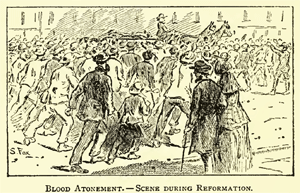
BLOOD ATONEMENT. -- SCENE DURING REFORMATION.
This was the way that "the Lord" was "worshipped" in Utah in 1856 and 1857. I have heard men say, "If I apostatize, I hope some of my brethren will love me well enough to slay me." The Saints are by no means a bloodthirsty people, but these are some of the results of the teachings during the Reformation.
It may be a matter of wonder to many how honest-hearted people could remain in a church that taught and practiced so many and such fearful evils. Concerning the murders, the majority of the people knew nothing, and supposed that the Indians were the assassins, as they were always told so. Yet some were sufficiently fanatical to believe that, if Brigham was the instigator, it was quite right. "The ancient order of things was being restored."
I have heard many Mormons declare that they hoped, some time, light would be thrown on these dark deeds, and the murderers made to pay the penalty of their crimes. But those who suspected that the authorities of the church were implicated felt that their only safeguard was silence. Those living in Utah during the Reformation, and seeing it in all its horrors, as I did, know very well the spirit of the teachings in the Tabernacle; and although many may be slow to impute the commission of crime to Brigham Young, they cannot but admit that his teachings all tended to make crime prevalent. And if they do not acknowledge his direct agency, they must see that his influence all went in the direction of the atonement of sin by blood. As far as I am concerned, I do not hesitate to say that I believe all these murders lie at his door, and that he will have to be personally responsible for them. His hands are red with innocent blood, his garments dyed with it, and no "Atonement" can ever wash out the damning spots.

